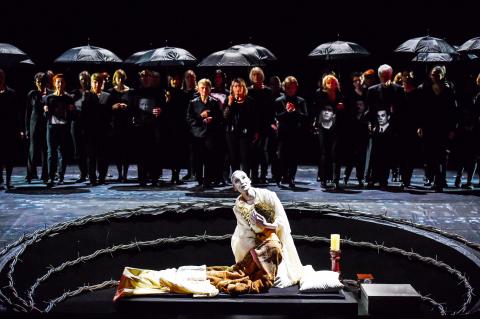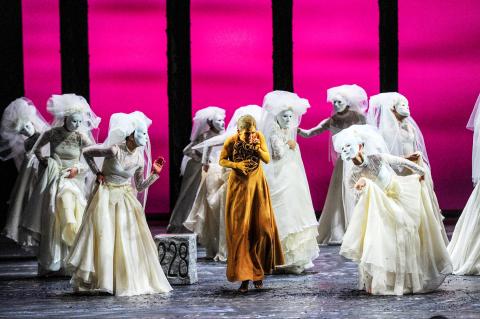After seeing Lin Mei-hong’s (林美虹) Schwanengesang (“Swan Song”) at the National Theater in 2010, I bemoaned the fact that this incredibly talented Yilan-born choreographer’s dance-theater works had never been seen in Taiwan before and voiced the hope that local audiences would have the chance to see more.
It took eight years before she was able to return, at the head of a different company, bringing TANZLIN.Z to perform The Little Mermaid at the National Taichung Theater in November last year.
Now, just seven months later she is coming back with the company, which will be performing one of her most critically acclaimed productions, Die Brautschminkerin (新娘妝), at the National Kaohsiung Center for the Arts (Weiwuying) next month at the invitation of Minister of Culture Cheng Li-chiun (鄭麗君).

Photo: Courtesy of Dieter Wuschanski
Lin created Die Brautschminkerin, which premiered in 2011, for her former company, the Tanztheater des Staatstheaters Darmstadt, and revived it two years ago for the Linz, Austria, troupe.
Die Brautschminkerin is based on Taiwanese writer Li Ang’s (李昂) short story Rouged Sacrifice (血妝彩祭), inspired by the horrors of the 228 Massacre in 1947.
Rouged Sacrifice tells of a woman whose husband is killed on their wedding night, and how she struggled to support herself and their son by working as a bridal make-up artist.

Photo: Courtesy of Dieter Wuschanski
The story is set in 1997 and examines the massacre and its repercussions through the eyes of two women, Mother Wang, whose husband was taken away by military police on their wedding night and executed, and a writer who wants to make a documentary about the massacre.
Central to Li’s story is that Taiwan had been suffering in silence for 50 years over the massacre, both the living and the ghosts or souls of the victims. A second key element is the repression of marginalized groups in Taiwan, for Mother Wang has been estranged from her son for years, having not spoken to him since learning that he was gay.
The two protagonists in Die Brautschminkerin are the mother of the past — the young bride who lost her groom on their wedding night — and the mother of the present — who has to confront the death of her son.
Haunting the stage are brides in white and groups of young men, while later a crowd of black-clad people of all ages wearing pictures of missing relatives, moving in silent protest against the world’s injustices.
Lin said Die Brautschminkerin allows women to express their pains, regrets and memories, and that she wanted to give a voice to those who are silenced, who are condemned to darkness.
However, she has said the piece is not just about Taiwanese history, but about the feelings of all those who have lived through coercion and the memories of those who have survived it, be it Spain in the 1930s, the atrocities of Nazi Germany to what is happening in many countries in the present day.
“One’s responsibility as an artist lies in experiencing the pulse of society and taking an interest in universal human values,” Lin said a talk at Weiwuying on June 1, “When Words Become Dance: Literature, Music and Images in Die Brautschminkerin.”
She also told the audience that she had been unsure about bringing Die Brautschminkerin to Taiwan, but as the European refugee crisis erupted in 2017, she realized that trauma and pain can occur anywhere.
Li also took part in the June 1 talk, and recounted how she met Lin at an international book festival, where they bonded over their common concern for human rights.
She told the audience that not only had she been in the audience of the 2011 premiere of Die Brautschminkerin, but has attended several other performances as well, including the premiere of the revival in February 2017.
Lin also drafted playwright and opera singer You Yuan-kiang (游源鏗), or A-kiang (阿鏗) as he is more commonly known, and France-based musician Yo Li-yu (游麗玉), famed for his gu-qin (古琴) compositions to give a Taiwanese flavor to the score for the production.
German arranger Michael Erhard pulled the disparate musical elements together, while Dirk Hofacker created the sets and costumes, as he did for The Little Mermaid.
Die Brautschminkerin runs about 80 minutes.

Growing up in a rural, religious community in western Canada, Kyle McCarthy loved hockey, but once he came out at 19, he quit, convinced being openly gay and an active player was untenable. So the 32-year-old says he is “very surprised” by the runaway success of Heated Rivalry, a Canadian-made series about the romance between two closeted gay players in a sport that has historically made gay men feel unwelcome. Ben Baby, the 43-year-old commissioner of the Toronto Gay Hockey Association (TGHA), calls the success of the show — which has catapulted its young lead actors to stardom -- “shocking,” and says

The People’s Republic of China (PRC) invaded Vietnam in 1979, following a year of increasingly tense relations between the two states. Beijing viewed Vietnam’s close relations with Soviet Russia as a threat. One of the pretexts it used was the alleged mistreatment of the ethnic Chinese in Vietnam. Tension between the ethnic Chinese and governments in Vietnam had been ongoing for decades. The French used to play off the Vietnamese against the Chinese as a divide-and-rule strategy. The Saigon government in 1956 compelled all Vietnam-born Chinese to adopt Vietnamese citizenship. It also banned them from 11 trades they had previously

Inside an ordinary-looking townhouse on a narrow road in central Kaohsiung, Tsai A-li (蔡阿李) raised her three children alone for 15 years. As far as the children knew, their father was away working in the US. They were kept in the dark for as long as possible by their mother, for the truth was perhaps too sad and unjust for their young minds to bear. The family home of White Terror victim Ko Chi-hua (柯旗化) is now open to the public. Admission is free and it is just a short walk from the Kaohsiung train station. Walk two blocks south along Jhongshan

Snoop Dogg arrived at Intuit Dome hours before tipoff, long before most fans filled the arena and even before some players. Dressed in a gray suit and black turtleneck, a diamond-encrusted Peacock pendant resting on his chest and purple Chuck Taylor sneakers with gold laces nodding to his lifelong Los Angeles Lakers allegiance, Snoop didn’t rush. He didn’t posture. He waited for his moment to shine as an NBA analyst alongside Reggie Miller and Terry Gannon for Peacock’s recent Golden State Warriors at Los Angeles Clippers broadcast during the second half. With an AP reporter trailing him through the arena for an